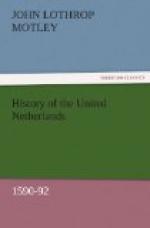On the 22nd July, Farnese, after firing two hundred and eighty-five shots at Fort Knodsenburg, ordered an assault, expecting that so trifling a work could hardly withstand a determined onslaught by his veterans. To his surprise they were so warmly received that two hundred of the assailants fell at the first onset, and the attack was most conclusively repulsed.
And now Maurice had appeared upon the scene, determined to relieve a place so important for his ulterior designs. On the 24th July he sent out a small but picked force of cavalry to reconnoitre the enemy. They were attacked by a considerable body of Italian and Spanish horse from the camp before Knodsenburg, including Alexander’s own company of lancers under Nicelli. The States troops fled before them in apparent dismay for a little distance, hotly pursued by the royalists, until, making a sudden halt, they turned to the attack, accompanied by five fresh companies of cavalry and a thousand musketeers, who fell upon the foe from all directions. It was an ambush, which had been neatly prepared by Maurice in person, assisted by Sir Francis Vere. Sixty of the Spaniards and Italians were killed and one hundred and fifty prisoners, including Captain Nicelli, taken, while the rest of the party sought safety in ignominious flight. This little skirmish, in which ten companies of the picked veterans of Alexander Farnese had thus been utterly routed before his eyes, did much to inspire the States troops with confidence in themselves and their leader.
Parma was too experienced a campaigner, and had too quick an eye, not to recognise the error which he had committed in placing the dangerous river Waal, without a bridge; between himself and his supplies. He had not dreamed that his antagonist would be capable of such celerity of movement as he had thus displayed, and his first business now was to extricate himself from a position which might soon become fatal. Without hesitation, he did his best to amuse the enemy in front of the fort, and then passed the night in planting batteries upon the banks of the river, under cover of which he succeeded next day in transporting in ferry-boats his whole force, artillery and: baggage, to the opposite shore, without loss, and with his usual skill.
He remained but a short time in Nymegen, but he was hampered by the express commands of the king. Moreover, his broken health imperatively required that he should once more seek the healing influence of the waters of Spa, before setting forth on his new French expedition. Meanwhile, although he had for a time protected the Spanish possessions in the north by his demonstration in Gelderland, it must be confessed that the diversion thus given to the plans of Maurice was but a feeble one.
Having assured the inhabitants of Nymegen that he would watch over the city like the apple of, his eye, he took his departure on the 4th of August for Spa. He was accompanied on his journey by his son, Prince Ranuccio, just arrived from Italy.




